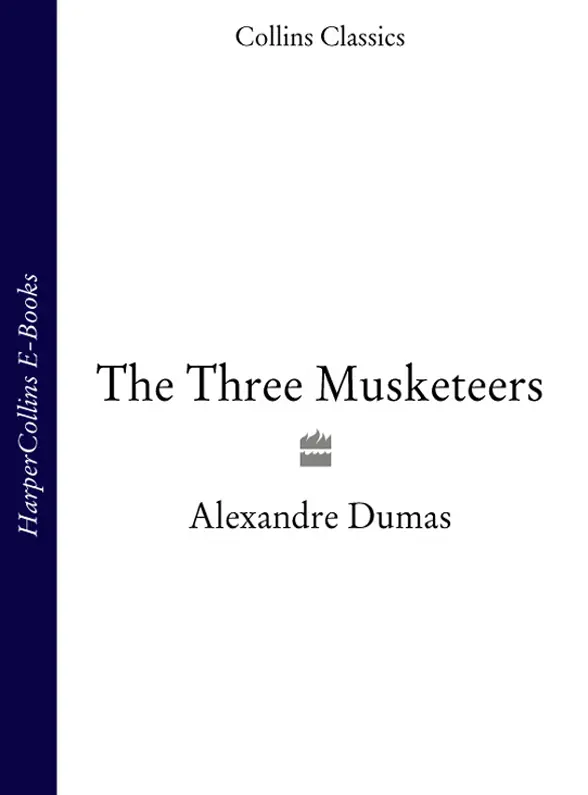
Alexandre Dumas
Cover
Title Page THE THREE MUSKETEERS Alexandre Dumas
Chapter 1 The Three Presents of M. D’Artagnan, the Father
Chapter 2 The Antechamber of M. de Treville
Chapter 3 The Audience
Chapter 4 The Shoulder of Athos, the Belt of Porthos, and the Handkerchief of Aramis
Chapter 5 The King’s Musketeers and the Cardinal’s Guards
Chapter 6 His Majesty King Louis the Thirteenth
Chapter 7 The Domestic Manners of the Musketeers
Chapter 8 The Court Intrigue
Chapter 9 D’Artagnan Begins to Show Himself
Chapter 10 A Mousetrap of the Seventeenth Century
Chapter 11 The Intrigue Becomes Confused
Chapter 12 George Villiers, Duke of Buckingham
Chapter 13 Monsieur Bonancieux
Chapter 14 The Man of Meung
Chapter 15 Civilians and Soldiers
Chapter 16 In which the Keeper of the Seals, Séguier, looked more than once after the bell, that he might ring it as he had been used to do
Chapter 17 The Bonancieux Household
Chapter 18 The Lover and the Husband
Chapter 19 The Plan of the Campaign
Chapter 20 The Journey
Chapter 21 The Countess de Winter
Chapter 22 The Ballet of “The Merlaison”
Chapter 23 The Appointment
Chapter 24 The Pavilion
Chapter 25 Porthos
Chapter 26 The Thesis of Aramis
Chapter 27 The Wife of Athos
Chapter 28 The Return
Chapter 29 The Hunt after Equipments
Chapter 30 “My Lady”
Chapter 31 English and French
Chapter 32 An Attorney’s Dinner
Chapter 33 Maid and Mistress
Chapter 34 Concerning the Equipments of Aramis and Porthos
Chapter 35 All Cats are alike Gray in the Dark
Chapter 36 The Dream of Vengeance
Chapter 37 The Lady’s Secret
Chapter 38 How, without disturbing himself, Athos obtained His Equipment
Chapter 39 A Charming Vision
Chapter 40 A Terrible Vision
Chapter 41 The Siege of La Rochelle
Chapter 42 The Wine of Anjou
Chapter 43 The Red Dove-Cot Tavern
Chapter 44 The Utility of Stove Funnels
Chapter 45 A Conjugal Scene
Chapter 46 The Bastion of St. Gervais
Chapter 47 The Council of the Musketeers
Chapter 48 A Family Affair
Chapter 49 Fatality
Chapter 50 A Chat between a Brother and Sister
Chapter 51 The Officer
Chapter 52 The First Day of Imprisonment
Chapter 53 The Second Day of Imprisonment
Chapter 54 The Third Day of Imprisonment
Chapter 55 The Fourth Day of Imprisonment
Chapter 56 The Fifth Day of Imprisonment
Chapter 57 An Event in Classical Tragedy
Chapter 58 The Escape
Chapter 59 What happened at Portsmouth on the Twenty-third of August, 1628
Chapter 60 In France
Chapter 61 The Carmelite Convent of Bethune
Chapter 62 Two Kinds of Demons
Chapter 63 A Drop of Water
Chapter 64 The Man in the Red Cloak
Chapter 65 The Judgment
Chapter 66 The Execution
Chapter 67 A Message from the Cardinal
The Epilogue
Classic Literature: Words and Phrases Adapted from the Collins English Dictionary
About the Author
Author’s Preface
History of Collins
Copyright
About the Publisher
CHAPTER 1 The Three Presents of M. D’Artagnan, the Father
On the first Monday of the month of April, 1625, the small town of Meung, the birthplace of the author of the “Romance of the Rose,” appeared to be in a state of revolution, as complete as if the Huguenots were come to make a second siege of La Rochelle. Many of the townsmen, observing the flight along the high street, of women who left their children to squall at the doorsteps, hastened to don their armour, and, fortifying their courage, which was inclined to fail, with a musket or a partisan, proceeded towards the inn of the Jolly Miller, to which a vast and accumulating mob was hastening with intense curiosity.
At that period alarms were frequent, and few days passed without some bourg or other registering in its archives an event of this description. There were the nobles, who made war on each other; there was the king, who made war on the cardinal; there was the Spaniard, who made war on the king; then, besides these wars, concealed or overt, secret or public, there were bandits, mendicants, Huguenots, wolves, and lackeys, who made war on the whole world. The townsmen always armed themselves against the bandits, the wolves, and the lacqueys; frequently against the nobles and the Huguenots; sometimes against the king; but never against the cardinal or the Spaniard. From this custom, therefore, it arose, that on the aforesaid first Monday in the month of April, 1625, the burghers, hearing a noise, and seeing neither the yellow and red flag, nor the livery of the Duke of Richelieu, rushed towards the inn of the Jolly Miller. Having reached it, every one could see and understand the cause of this alarm. A young man—
But let us trace his portrait with one stroke of the pen. Fancy to yourself Don Quixote at eighteen—Don Quixote peeled, without his coat of mail or greaves—Don Quixote clothed in a woollen doublet, whose blue colour was changed to an undyable shade, a shade between the lees of wine and a cerulean blue. The countenance long and brown; the cheek-bones high, denoting acuteness; the muscles of the jaw enormously developed—an infallible mark by which a Gascon may be recognised, even without the cap, and our youth wore a cap, adorned with a sort of feather; the eye full and intelligent; the nose hooked, but finely formed; the whole figure too large for a youth, yet too small for an adult; an inexperienced eye would have taken him for the son of a farmer on a journey, had it not been for the long sword, which, hanging from a leathern belt, banged against the heels of its owner whilst he was walking, and against the rough coat of his steed when he was mounted;—for our youth had a steed, and this steed was at the same time so remarkable as to attract observation. It was a Beaunese sheltie, of about twelve or fourteen years of age, yellow as an orange, without any hair on its tail, but abundance of galls on its legs, and which, whilst carrying its head lower than its knees, making the application of a martingale unnecessary, yet managed gallantly its eight leagues a day. Unfortunately, these useful qualities of the steed were so well concealed under its strange coat and eccentric gait, that at a time when every one knew something of horses, the apparition of the aforesaid sheltie at Meung, which it had entered about a quarter of an hour before, by the gate of Beaugency, produced a somewhat unfavourable sensation or impression, which extended even to its master. And this impression was the more painful to young d’Artagnan (for that was the name of the Don Quixote of this second Rozinante), that he could not conceal from himself the ridiculous light in which he, albeit so good a horseman, was placed by such a steed. He had, therefore, sighed deeply when he accepted the gift from M. d’Artagnan, his father: he knew that such a beast was worth about twenty francs. It is true that the words which accompanied the present were above price.
“My son,” said the Gascon gentleman, in that pure Beaunese patois or dialect, which Henry IV. could never entirely shake off—“my son, this horse was born in the paternal homestead about thirteen years ago, and has remained in it ever since, which ought to make you regard it with affection. Never sell it; let it die honourably of old age, and in tranquillity; and should you make a campaign with it, take as much care of it as you would of an old servant.
Читать дальше













